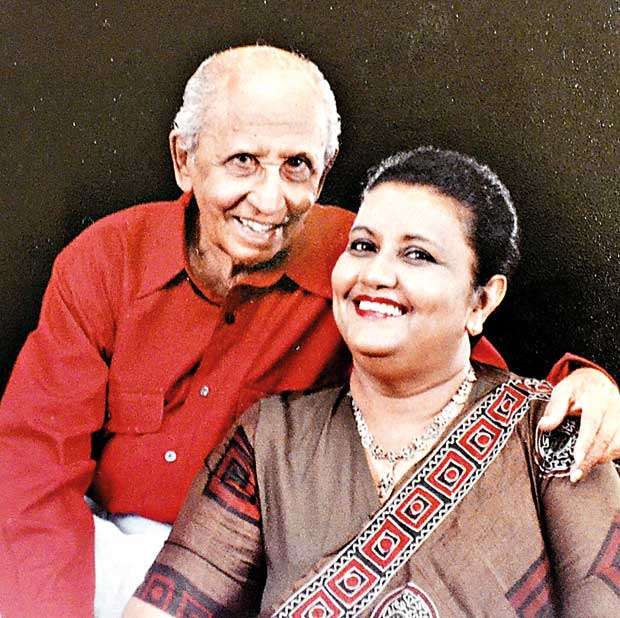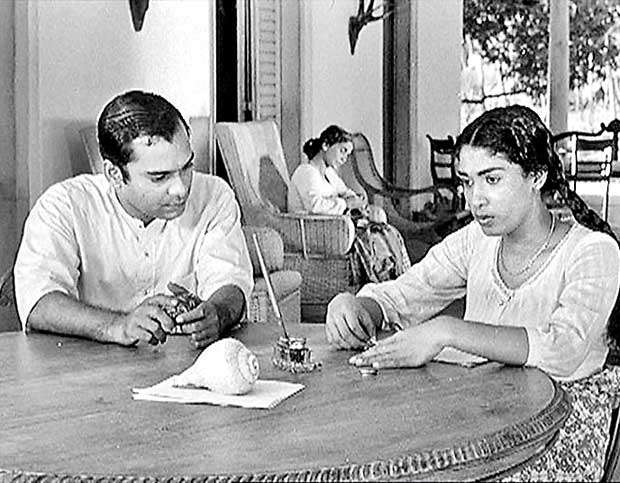14 Feb 2019 - {{hitsCtrl.values.hits}}

 Sri Lankans who watched the state funeral accorded to Lester James Peries (LJP), the filmmaker, hailed as the architect of authentic Sinhala cinema and creator of some of the best Sinhala films, greatly appreciated t he glowing tributes showered on him during the funeral. The comments came from the highest in the Land. And the eulogies did not stop there. A pledge was made before his mortal remains that No. 24, Lester James Peries Mawatha, Colombo 5, the residence of the Peries’ for 49 years, would be converted to a cinematic museum in the name of the maestro. The house which was live with cinematic activity for nearly five decades, would be made into a hub for those in the industry.
Sri Lankans who watched the state funeral accorded to Lester James Peries (LJP), the filmmaker, hailed as the architect of authentic Sinhala cinema and creator of some of the best Sinhala films, greatly appreciated t he glowing tributes showered on him during the funeral. The comments came from the highest in the Land. And the eulogies did not stop there. A pledge was made before his mortal remains that No. 24, Lester James Peries Mawatha, Colombo 5, the residence of the Peries’ for 49 years, would be converted to a cinematic museum in the name of the maestro. The house which was live with cinematic activity for nearly five decades, would be made into a hub for those in the industry.
Such pledges made at public gatherings can be considered as political rhetoric made to please the crowd charged with emotions. But did these pledges thus made in public, drive fear into those who owned the house and hastened them to take steps to safeguard their property?
The Peries’ lived in the house on rent. They believed they will be able to remain there, the few more years left of their lives.
Sumitra Peries, the wife of the legend and Sri Lanka’s first woman film director, their lab, Ceasar and the staff however, now live in Old Kottawa Road, Mirihana.Sumitra insists that the owners did not force her out of the Colombo house where they lived since 1969. About two years ago, while LJP was still alive, they were informed by a legal firm that the house had been sold by its owners to a developing company. The then Justice Minister Wijeyadasa Rajapakshe visited them and took Sumitra to the lawyers when the Agreement was renewed to regularise the tenancy. Except for some routine visits, the company had not made any attempt to force them out. And Sumitra as usual, had kept sending the monthly rent to the owners by registered post.
His fusion of literature and cinema, enriched cinematic art and when making films, he went deep into the roots of Lankan society focusing mostly on the family as the central theme of his cinema
Following LJP’s demise however, a company representative visited Sumitra when she was asked whether she would like to be relocated? It was done she insists, in a very civilised manner. They took her around and showed houses but she chose the present house of which the cost was shared by both parties.
The next hurdle was shifting with their belongings and old pieces of art that had got collected for nearly 50 years. What could not be accommodated was given away to friends and relatives. What broke her heart however was parting with the prized collection of LJP’s books. She said he had a rare collection of books and there was never a day when he didn’t read one of them. Even when LJP couldn’t read in the latter stages, there was an opened book on his lap. She gave the books to the Public Library where she believes the books will be best made use of.
The cinematic monument thus promised by those who hold the reins of the country’s culture, gave way to property development!
Why are people concerned of the fate of the Peries’? Have we as a nation failed in giving what we got from them? LJP took away the direction of the film industry from the South Indian tradition that prevailed at the time and created films with a true Lankan identity. His fusion of literature and cinema, enriched cinematic art and when making films, he went deep into the roots of Lankan society focusing mostly on the family as the central theme of his cinema. Thus, he induced serious film-goers to go to the theatre halls which commenced a dialogue on cinema. All this began at a time when there was virtually no film industry in Sri Lanka.
Why are people concerned of the fate of the Peries’? Have we as a nation failed in giving what we got from them? LPJ took away the direction of the film industry from the South Indian tradition that prevailed at the time and created films with a true Lankan identity
Are cinematic giants appreciated more outside than within their countries? LJP did win awards at local film festivals. A road was named after him. A maintenance allowance commenced paying LJP’s health bills at the age of 99 years. A month later, he passed away. And he did get a grand funeral. But was that all he deserved? Were any attempts made to protect his historic cinematic creations for posterity?

The ‘Guardian’ newspaper commenting on his death said “like his contemporary Satyajit Rai, he was more highly regarded abroad than in his native country. The film icon of Sri Lanka became a giant in Asian cinema.”
Long before LJP earned any recognition for his “Rekawa” at home, it took wing to the 10th Cannes Film Festival in 1957, to compete with a film of the famed Italian Federico Fellini. LJP returned with the Palme d’Or Award. Thereafter, he became a regular invitee to the Mecca of Films - Cannes Film Festival, when he was invited for the Director’s Fortnight after Satyajit Rai and Akira Kurosawa and won turns to screen “Baddegama” (1980)“Kaliyugaya” (1982) and his last film “Wekanda Walawwa” in 2003. He also won the Fellini Gold Medal in the same year in Cannes along with Clint Eastwood.
Later, in 1997, France decorated him with “Commander in the Order of Arts and Letters” which was the highest national honour bestowed on a person and the only Sri Lankan to win it. In 2014, “Chevalier in the Order of Arts and Letters” was conferred on Sumitra.
India awarded LJP the Lifetime Award in 2001, the only occasion an Award was given in India to a film-maker after Michael Angelo Antonioni. That was the Award that went missing at his funeral and was later found. LJP’s“Gamperaliya” swept the boards at the Indian Film Festival in 1965.
India awarded LJP the Lifetime Award in 2001, the only occasion an Award was given in India to a film-maker after Michael Angelo Antonioni. That was the Award that went missing at his funeral and later found
Sumitra represented Sri Lanka at the celebration of the 70th year of diplomatic relations between India and Sri Lanka when two of her films were screened at Mumbai and Calcutta Film Festivals. Last month she was awarded the Japanese Foreign Minister’s Commendation for her contribution “in the international field.”
France digitized and restored LJP’s “Rekawa,” “Nidhanaya” and “Gamperaliya” and screened them in France and at the European Film Festival. Germany dubbed five of LJP’s films and one of Sumitra’s. These were screened in Germany and on its TV channels. University of California (UCLA) carried out preservation of some of LPJ’s films. Therefore, except for the handful of films out of LJP’s 20 films and Sumitra’s10 that had been preserved, the rest of the films that reflect the life and soul of Lankan society of a period which does not exist any more, have got lost to the vagaries of time. And, due to the disinterest of relevant authorities.
30 Nov 2024 52 minute ago
30 Nov 2024 3 hours ago
30 Nov 2024 4 hours ago
29 Nov 2024 29 Nov 2024
29 Nov 2024 29 Nov 2024